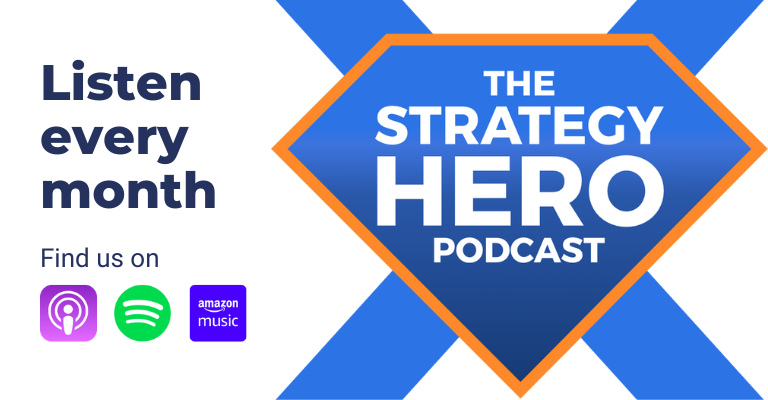From the transition of a traditional performance measurement structure in Balanced Scorecard to the rise of OKRs, here's what I learned from season two, episode eight of Strategy Hero with Paul Niven.
Paul Niven, President of OKRs Training, has a career that cannot be truly appreciated on paper.
From his beginnings in public accounting to running thousands of engagements as an OKR leader, bringing him onto the podcast was an opportunity to see where performance management has been - and where it's going.
Here's what I learned from my time with Paul.
It’s important to note that my opinions do not reflect those of i-nexus, Paul Niven, and OKRs Training.
Enjoy!
Why Paul?
When you think about the authors in the world of strategy execution, there are countless who have invaluable insights. There are many more who have fresh takes on visualizing strategy. There are even those who talk about one-page strategies. And then there's Paul Nevin.
Paul's experiences are forged in the reality of daily strategy execution. He's a brilliant consultant, just as he is a scribe. Author of Balanced Scorecard and OKR books that sit on the shelves of executives, consultants and students across the world.
Paul is the leading voice in the world of Balanced Scorecard and OKRs.
With a who's who of companies ranging from Mercedes Benz to the US Navy, Paul innately makes strategy execution a reality.
When so many talk about it, he talks the talk, walks the walk, and guides you along the way.
Paul's always known he wanted to speak to the masses:
"That was one of those moments in your life where you think, I've got a choice to make here. I could stay in the corporate world and keep helping this organization, or I could take these ideas to the world...I chose the latter. So I saw the power of strategy execution through better measurement and decided to leave the corporate world."
It was my pleasure to bring him onto the podcast.
The power of a balanced scorecard
Paul’s career was largely shaped by his early experience with the Balanced Scorecard (BSC).
At the offset, Paul shared a pivotal moment from his time at an electric utility company where the organization self-implemented the BSC to fix broken processes and improve customer engagement.
“We fixed a lot of those broken processes...our customer engagement scores improved, but the big ‘aha’ for me was the employee understanding of strategy.”
Before the BSC, only a small percentage of employees understood the company’s strategy; afterward, the number soared into the 80s.
Employee engagement is an often overlooked factor in successfully executing strategic plans. That's why it was fascinating to hear from Paul how and why the BSC created alignment across the organization when typical management methods seldom did.
To see employees understand the company’s goals but also how their roles fit into the bigger picture, is a level of engagement that's key for any leader looking to drive meaningful change.
Evolving to OKRs for flexibility and accountability
As the podcast continued, Paul spoke about the signs that BSC had to evolve.
While Paul still advocates for the BSC, he recognizes its limitations, particularly in large organizations.
He noted how “as you go lower into an organization...it can become a bit of a straightjacket.”
The BSC’s predefined perspectives—financial, customer, internal processes, and learning/growth—didn’t always resonate with employees focused on specific operational duties.
"As you get lower to the department level, team level...it's really important to give people that autonomy to tell that story...
As we got lower in the organization, is that the quality of the objectives and measures were poorer. They were just clearly...saying, okay, I need to come up with a learning and growth measure here. It's number of meetings...
What I really liked about OKRs was that, again, that freedom, that permission to really identify what you uniquely could bring to the table."
OKRs give people autonomy to tell their own story about what’s most important strategically.
This flexibility is especially valuable in teams or departments where rigid frameworks easily feel limiting. OKRs allow employees to set more dynamic, challenging goals while maintaining alignment with broader strategic objectives.
This hybrid approach—combining the structural foundation of BSC with the flexibility of OKRs—enables leaders to pull together different strategic tools based on their needs, their organization's structure, and the different layers of that organization.
The role of champions in OKRs
I appreciated that Paul consistently applied a lens of pragmatism to every talking point. That was never more evident than our conversation on the role of champions in OKR.
Paul explained the need for internal champions to drive successful OKR adoption:
“We ask our clients to nominate what we call an OKR champion to work with us, the consultants, for knowledge transfer and to lead the in-house implementation...
And I've seen that with some of these champions over the years, too, where they just realized, wow, the whole world of work can kind of be turned upside down. And this is exciting. And that's one of the things that I love most about my job is when I see those lights go on."
These champions are the logistical and philosophical “heart and soul” of the roll out.
I am a big believer that change doesn't happen by itself. Change most certainly is not a new process or a new technology. Hearts and minds are what drive change, not the item/process that are being addressed.
So, it struck me that it’s not enough to introduce a framework like OKRs; you need dedicated people to shepherd it through.
Without strong internal ownership, "even the best-laid plans of mice and men..." Idioms aside, clearly initiatives can falter.
Paul’s emphasis on having OKR ambassadors—subject matter experts who can help reinforce the process at every level—underscores the importance of change management.
Be data-driven, but human-centric
This is a common theme that we encounter throughout every season of the Strategy Hero podcast.
While discussing the importance of data, something our Charlie Sharman episode also addressed, Paul acknowledged its value, but warned against over-reliance: “There’s never going to be a substitute for human intuition.”
While AI and analytics offer powerful insights, Paul urged leaders to interpret data with a human lens to make informed decisions.
He cited a key principle: “Locke and Latham found that goals need to be specific and challenging.” In other words, while data can help track progress, it’s crucial that leaders set clear, ambitious objectives that push the organization to excel. Vague or overly broad goals, Paul warned, can lead to disengagement and failure.
My takeaway: Balanced OKRs are the best OKRs
As I reflect, I sense that my key takeaway is that it's no one tool or methodology that makes success. But success does involve combining the tools and methodologies that work for you and your circumstance.
Paul's hybrid style—blending the structured alignment of BSC with the flexibility of OKRs—is a blueprint that may very well suit your environment. It's the evolution of the scorecard into the fluid, agile nature of modern organizations.
What’s clear from our conversation is that strategy, at its core, is about people.
Whether through BSC or OKRs, successful execution requires not just a framework but also engaged, empowered employees who understand their role in driving the organization forward.
Thanks for being our eighth hero of the season, Paul!
Listen to the episode
Paul's episode was the eighth of season two of Strategy Hero.
You can listen to Paul's episode here, search "Strategy Hero" wherever you find your favorite podcasts, or click the play button below.
About Strategy Hero
Published on the last Thursday of every month, the Strategy Hero podcast delves into business strategy and transformation.
Each cast shines a spotlight on a Strategy Hero – inspirers, boundary pushers, and leaders of change from all walks of life – armed with practical advice on achieving your goals.
Episodes explore topics around operational excellence, Lean management, process improvement, change management, and much, much more. Available where all great podcasts live, listen on-demand today and discover the Strategy Hero inside you.
About the host
James Milsom is Head of Marketing at i-nexus, but James is a storyteller. He’s the UK’s biggest Georgia Bulldogs fan (Go Dawgs!) and lives and breathes marketing.
The Strategy Hero podcast is his opportunity to bring some of his conversations with mentors, inspirers, and people anew to you every month.
He’s behind the content read and watched by people like you and lives to educate and help others.
If you’d like to learn more about him, connect with him on LinkedIn and subscribe to the Strategy Hero podcast today!



.jpg?width=352&name=KPIs%20(3).jpg)